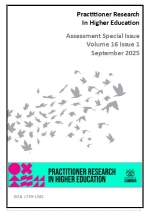Feedback Interchange in Small-Group Discussion: An Interpretive Review of the Literature
##plugins.themes.bootstrap3.article.main##
Abstract
The concern of this paper is with small-group discussion in university teaching as a site where feedback is typically generated and communicated to humanities and social sciences students on their everyday learning. The theme is explored by means of a wide-ranging review of the salient literature, considered afresh through the lens of feedback, and against the backcloth of an ongoing transformation in how feedback in higher education is understood, investigated and practised. It concludes that, in contrast to feedback on graded students' assessments, feedback in small-group discussion is characteristically embedded in real-time teaching-learning interchanges, verbally expressed, generated by student peers as well as by the tutor and, since it is on open display, offers opportunities for vicarious learning. It is also a crucial milieu in which students can practise and be guided towards discursive verbal fluency in discipline-specific meaning-making. Nonetheless, the feedback potential of learning through discussion is often unrealised, and robust evidence is lacking of its impact on the quality of learning over time.
##plugins.themes.bootstrap3.article.details##
Proposed Policy for Journals That Offer Delayed Open Access
Authors who publish with this journal agree to the following terms:
- Authors retain copyright and grant the journal right of first publication, with the work for one year after publication simultaneously licensed under a Creative Commons Attribution License that allows others to share the work with an acknowledgement of the work's authorship and initial publication in this journal.
- Authors are able to enter into separate, additional contractual arrangements for the non-exclusive distribution of the journal's published version of the work (e.g., post it to an institutional repository or publish it in a book), with an acknowledgement of its initial publication in this journal.
- Authors are permitted and encouraged to post their work online (e.g., in institutional repositories or on their website) prior to and during the submission process, as it can lead to productive exchanges, as well as earlier and greater citation of published work (See The Effect of Open Access).

